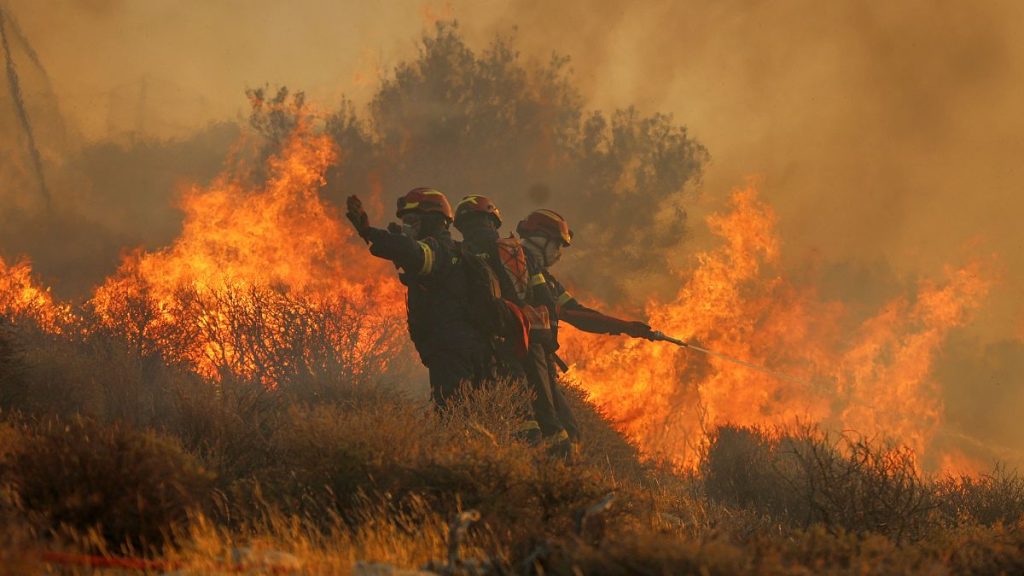In a recent spate of devastating wildfires, Greece and Turkey have faced enormous challenges, prompting mass evacuations and significant destruction. On the southern island of Crete, thousands have fled from holiday resorts, while adjacent Turkey contends with its own deadly blazes, marked by at least one fatality. Local officials have mobilized firefighting resources, striving to control the flames and prevent further catastrophe.
| Article Subheadings |
|---|
| 1) Outbreak of Wildfires in Greece |
| 2) Evacuations and Rescue Operations |
| 3) Impact on Local Communities |
| 4) Turkey’s Wildfire Challenges |
| 5) Climate Change’s Role in the Crisis |
Outbreak of Wildfires in Greece
Firefighters in Greece are battling fierce wildfires that have erupted on the southern island of Crete. The fires started amid extreme heat conditions that have become commonplace during the summer months in the Mediterranean. As of Thursday, the flames have spread rapidly, causing significant alarm among local authorities and residents alike. The situation worsened when winds picked up, causing the fires to expand unpredictably, leaving firefighters scrambling to contain the flames before sunset when air support is grounded.
Evacuations and Rescue Operations
With the fires threatening the Ierapetra area, more than 5,000 individuals—including tourists, hotel workers, and local inhabitants—were evacuated. Local officials and hotel associations collaborated on the evacuations, ensuring that vulnerable populations were swiftly relocated from the danger zones. Reports indicate that a few residents found refuge in the sea, necessitating heroic rescues by local fishermen and divers. This round of emergency evacuations reflects the dire conditions posed by the advancing wildfires, as the swift response aims to protect lives amid chaos.
Impact on Local Communities
The wildfires have wreaked havoc on local communities, resulting not only in property damage but also in the loss of livestock. Officials have reported that volunteers discovered dead animals, including farm animals that were tragically burned alive while trapped inside agricultural facilities. Evacuees were temporarily relocated to other hotels, while some spent the night at an indoor basketball stadium that has been repurposed as an emergency shelter. Local officials are emphasizing the need for comprehensive recovery efforts to help affected communities rebuild after this disaster.
Turkey’s Wildfire Challenges
Simultaneously, Turkey is grappling with its own wildfire crisis, which has escalated dramatically over recent days. Authorities reported the discovery of an 81-year-old man found dead due to smoke inhalation, marking a grim milestone as the first fatality attributed to these wildfires. Tens of thousands have been forced to flee their homes as firefighters work diligently to subdue blazes near popular vacation destinations and residential areas. The town of Ödemiş has been particularly hard hit, where emergency services worked to ensure the safety of nearly 37 evacuated villagers.
Climate Change’s Role in the Crisis
Both Greece and Turkey are confronting wildfires that have become not just a seasonal menace but also a critical concern exacerbated by climate change. Reports show that over the past week, hundreds of wildfires have ignited, fueled by extreme heat, strong winds, and low humidity levels. Turkish authorities took legislative action on Wednesday, adopting a landmark climate law aimed at achieving net-zero emissions by 2053. Experts emphasize the need for comprehensive climate strategies, as climate change has been identified as a significant factor influencing the increasing frequency of such devastating wildfires.
| No. | Key Points |
|---|---|
| 1 | Thousands evacuated from Crete due to wildfires. |
| 2 | An 81-year-old man is the first reported fatality in Turkey’s wildfires. |
| 3 | Significant damage reported to homes and livestock in affected areas. |
| 4 | Emergency shelters were established to assist those displaced by the fires. |
| 5 | Climate change linked to increasing frequency and severity of wildfires. |
Summary
The recent wildfires in both Greece and Turkey represent a critical environmental and humanitarian crisis, highlighting the urgent need for effective emergency response and long-term climate strategies. With thousands displaced and considerable property damage, this two-nation incident underscores the vulnerabilities facing Mediterranean countries in the face of ongoing climate challenges. As authorities work tirelessly to contain the fires, the looming question remains: how can these nations adapt and prepare for an increasingly unpredictable climatic future?
Frequently Asked Questions
Question: What are the main causes of the wildfires in Greece and Turkey?
The wildfires in Greece and Turkey have been caused by a combination of extreme heat, strong winds, and low humidity, which are exacerbated by climate change. These interconnected environmental factors have created a perfect storm for wildfires to ignite and spread rapidly.
Question: How are local authorities responding to the wildfires?
Local authorities are executing evacuation plans and deploying firefighters to battle the flames. Emergency response includes relocating thousands from danger zones to safer locations and putting emergency shelters in place to accommodate those affected.
Question: What impact do wildfires have on the environment?
Wildfires can cause irreversible damage to ecosystems, including loss of vegetation, wildlife habitats, and air quality deterioration due to smoke and pollutants. They may also lead to soil erosion and long-term changes in regional climate patterns.


